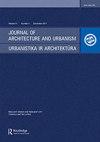全球本土化挑战与当代建筑:对阿迦汗奖获奖者共同全球指标的系统回顾
IF 0.8
0 ARCHITECTURE
引用次数: 0
摘要
来自不同国际社会的当地报道认为,全球本土化建筑模式的成功实现符合2030年联合国可持续发展目标(sdg)。阿迦汗文化基金会的伊斯兰建筑国际项目也优先考虑对建筑项目成功驱动因素的理解。本研究旨在通过分析阿迦汗奖的报告,发现通用全球指标进入定性设计评估的潜力。本研究选择的方法是定量的方法,使用系统的内容分析和编码技术对从技术中获得的定性数据。运用感性和抽象的国际、国家和地方指标,提取和分析了促成作品成功的物质因素、非物质因素、现代因素和传统因素及其组合。合理适应症(现代因素和物理因素的结合)具有相对优势。混合数据分布为评估作品提供了基础,这可以用于管理穆斯林社会当代建筑中的全球化挑战。本文章由计算机程序翻译,如有差异,请以英文原文为准。
GLOCALIZATION CHALLENGES AND THE CONTEMPORARY ARCHITECTURE: SYSTEMATIC REVIEW OF COMMON GLOBAL INDICATORS IN AGA KHAN AWARD’S WINNERS
Local reports from different international societies have considered the achievement of the successful Glocalized architecture model in line with the 2030 UN Sustainable Development Goals (SDGs). The Aga Khan Cultural Foundation’s International Program for Islamic Architecture has also prioritized the understanding of the success drivers in architectural projects. This study aimed to detect the potentials of the common global indicators to access qualitative design assessment through analyzing the Aga Khan Award’s reports. The selected methodology in the present study is a quantitative approach using the systematic content analysis and coding techniques for qualitative data obtained from the technical. The physical, non-physical, modern, and traditional factors that have contributed to the success of the works as well as their combinations were extracted and analyzed using Sensible and Abstract international, national, and local indications. There is a relative superiority for Sensible indications (A combination of modern and physical factors). The hybrid data distribution provides the ground to assess the works, and this can be used to manage the globalization challenges in the contemporary architecture of Muslim societies.
求助全文
通过发布文献求助,成功后即可免费获取论文全文。
去求助
来源期刊

Journal of Architecture and Urbanism
ARCHITECTURE-
CiteScore
1.30
自引率
14.30%
发文量
12
审稿时长
15 weeks
期刊介绍:
The Journal of Architecture and Urbanism publishes original research on all aspects of urban architecture.
 求助内容:
求助内容: 应助结果提醒方式:
应助结果提醒方式:


